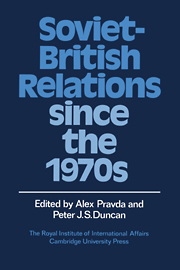Book contents
- Frontmatter
- Contents
- Contributors
- Acknowledgments
- 1 Introduction: pre-perestroika patterns
- 2 The historical perspective
- 3 Soviet perspectives on Britain and British foreign policy
- 4 British perspectives on the Soviet Union
- 5 The security dimension
- 6 Anglo-Soviet relations: political and diplomatic
- 7 The Soviet Union and the Left in Britain
- 8 Anglo-Soviet cultural contacts since 1975
- 9 Trade relations: patterns and prospects
- 10 Doing business with the USSR
- 11 Conclusions: Soviet-British relations under perestroika
- Index
8 - Anglo-Soviet cultural contacts since 1975
Published online by Cambridge University Press: 29 October 2009
- Frontmatter
- Contents
- Contributors
- Acknowledgments
- 1 Introduction: pre-perestroika patterns
- 2 The historical perspective
- 3 Soviet perspectives on Britain and British foreign policy
- 4 British perspectives on the Soviet Union
- 5 The security dimension
- 6 Anglo-Soviet relations: political and diplomatic
- 7 The Soviet Union and the Left in Britain
- 8 Anglo-Soviet cultural contacts since 1975
- 9 Trade relations: patterns and prospects
- 10 Doing business with the USSR
- 11 Conclusions: Soviet-British relations under perestroika
- Index
Summary
THE HISTORICAL BACKGROUND
Cultural relations serve as a barometer of Anglo-Soviet political relations. They are seen by both sides as an important element in developing and consolidating a burgeoning political relationship, but are adversely affected when the political climate deteriorates.
Cultural and scientific contacts between the Soviet Union and Britain were minimal during the Stalin period. Military co-operation during the Second World War led the British Foreign Office to hope for a friendly political atmosphere and proper cultural relations, including student exchanges, with the USSR after the war. However, the advent of the Cold War made the establishment of meaningful contacts unrealisable. Stalin's death opened the way for scientific and cultural exchanges with the West. These were to be a byproduct of Khrushchev's reformation of Soviet foreign policy and of his quest for peaceful coexistence. One major advantage of détente would be the possibility of ending Soviet separation from world science. Unlike Stalin, Khrushchev saw that isolation from Western scientists and lack of contact with recent developments contributed to technological backwardness. Khrushchev's and Bulganin's visit to Britain in April 1956, during which specific references were made to increased cultural, scientific and technological exchanges, seemed to herald a breakthrough. The Suez, Hungarian and Berlin crises delayed the signing of the Agreement on Relations in the Scientific, Technological, Educational and Cultural Field, 1960–61, until 1 December 1959.
This Cultural Agreement has subsequently been renegotiated every two years and spells out in considerable detail the scientific, educational and cultural exchanges which it is intended should take place. However, this is essentially an enabling document, and the extent to which its provisions have been implemented has been significantly influenced by the political climate, in addition to other factors such as financial stringencies and Soviet bureaucratic inefficiency.
- Type
- Chapter
- Information
- Soviet-British Relations since the 1970s , pp. 168 - 192Publisher: Cambridge University PressPrint publication year: 1990
- 1
- Cited by



